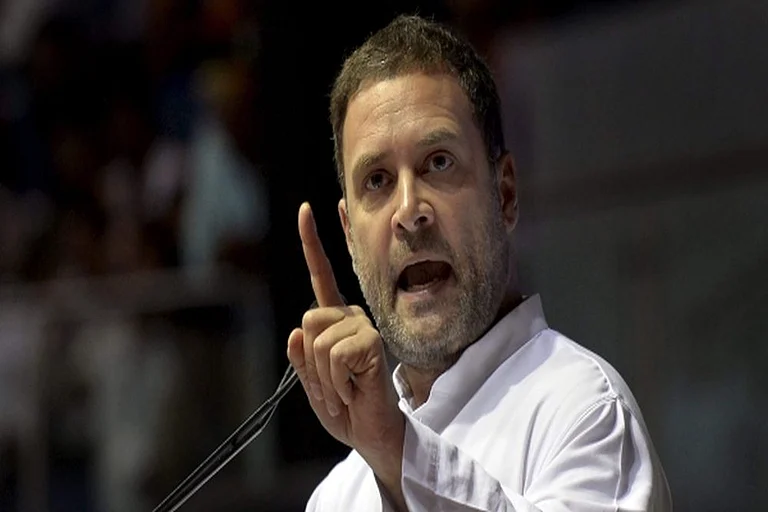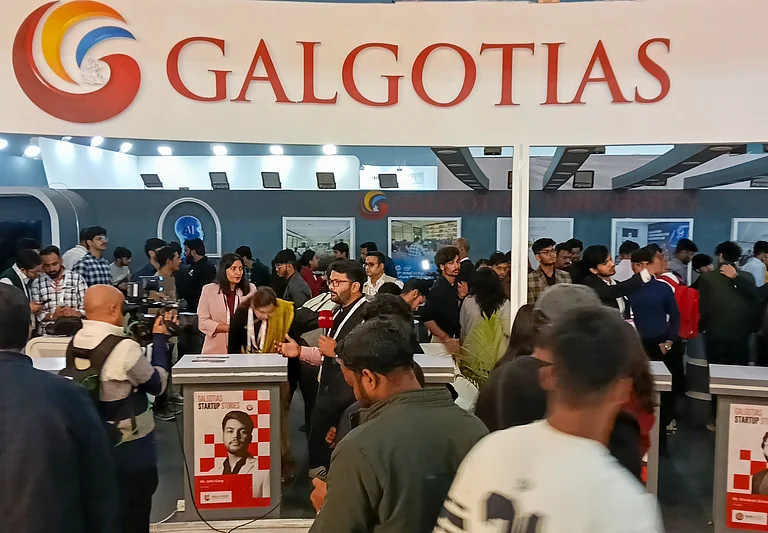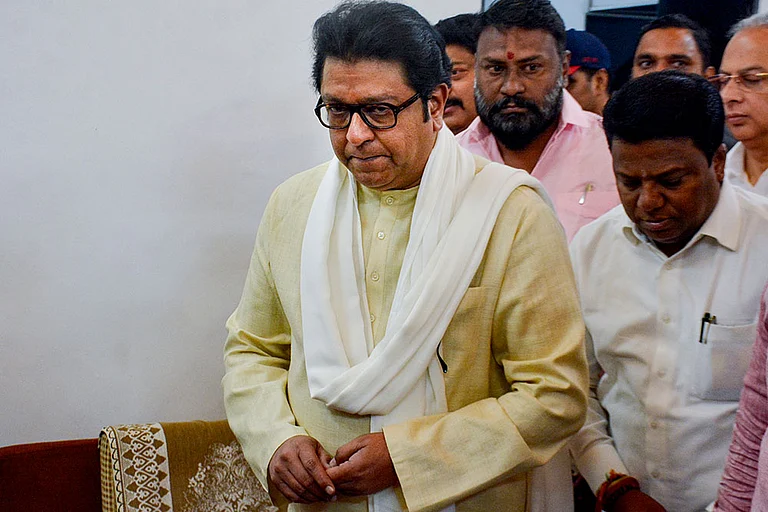The remarks Congress MP and Lok Sabha Leader of Opposition (LoP) Rahul Gandhi made in the United States this week have drawn flak in India, especially from the ruling BJP, something that happens almost every time the leader speaks on foreign soil.
From accusing the Rashtriya Swayamsevak Sangh (RSS) and the Bharatiya Janata Party (BJP) of believing that women should stay at home to saying that the fight in India is not about politics, rather about RSS 'considering' some religions, languages and communities of being inferior to others, Rahul Gandhi's recent addresses in the US gave enough ammo to the BJP to slam him.
The Congress leader also said that the attitude of Indian men towards women needs to change, adding that he supports women's role in politics right from the women's reservation bill.
Taking a swipe at the BJP and RSS for "their belief" that women should be restricted to a particular role, Rahul said, "The RSS believes that India is one idea. We believe that India is a multiplicity of ideas."
His comments drew heat from the BJP, with Union Home Minister Amit Shah saying that "Rahul Gandhi's statement lays bare the Congress' politics of causing rifts on the lines of regionalism, religion, and linguistic difference."
The BJP further blasted Rahul and said that he is trying to create a "dangerous narrative" by speaking on "sensitive issues" abroad.
However, the tussle over Indian leaders and their remarks about the nation's politics on foreign soil is not a new story. Right from former Prime Minister Morarji Desai to the now PM, Narendra Modi, political leaders have made statements that opposing parties claim denigrate them or the nation.
Narendra Modi
Opposition in India has not stayed behind in highlighting Prime Minister Narendra Modi's remarks about India in foreign nations.
The answer given by PM Modi during a rare media interaction at the White House in the US last year was widely condemned. As a US journalist asked what India would do to improve the rights of religious minorities, Modi said, "I am surprised at what you said. We are a democracy. Democracy is in our DNA, it is a part of our spirit. Democracy runs in our veins. We live and breathe democracy. And it is in our constitution."
The Prime Minister asserted that when people live in a democracy, then there is "no question of democracy". He said that irrespective of one's religion, caste, age or geography, amenities are accessible to everyone.
However, what led to further heat was the online trail of attacks that was launched at the US reporter for asking Modi the question regarding minorities' rights. The Biden administration had blasted the harassment campaign against the reporter, saying that it is "completely unacceptable and its antithetical to the very principles of democracy that... were on display last week during the state visit".
During an interview with CNN, former US President Barack Obama said that India risked "pulling apart" if the Muslim minority was not respected. He had said that if he had a conversation with PM Modi -- whom he knows well -- he would partly argue that "if you do not protest the rights of ethnic minorities in India, there is a strong possibility at some point that India starts pulling apart".
PM Modi had, during a visit to Berlin in 2022, had said that Indians chose to end the politically unstable atmosphere of the last three decades by bringing the BJP to power at the Centre. "After 30 years, a full majority government was elected in 2014 and the people of India made the government stronger in 2019," he had said.
During a visit to Qatar's capital Doha in 2018, PM Modi's subtle jibe at the Congress drew heat from the grand old party. Comparing the nation's image from the pre and post-NDA era, Modi made veiled statements, saying, "Corruption has made our country hollow, eating into its vitals like termite. Today across the world, India's image has been enhanced and the country is being viewed respectably." He had said that people notice the change now when those from other countries meet India.
In 2015, just a year after he was elected to become the Prime Minister of India, Modi had gone on a three-nation visit. While in Toronto, he had remarked that India was not "Scam India" anymore, but "Skill India", highlighting the purported scams during the pre-NDA government, while promoting his administration's flagship skill development initiative.
Rahul Gandhi
The Congress MP's remarks on foreign soil drawing ire in India is an old-new event. During his visit to the United Kingdom last year, Rahul Gandhi had compared the RSS with Muslim brotherhood, calling the organisation to be 'facist'.
"You can call it a secret society. It’s built along the lines of the Muslim Brotherhood and the idea is to use the democratic contest to come to power and then subvert the democratic contest afterwards," Rahul had said about RSS.
He had said that BJP's ideological parent, RSS, had managed to capture Indian institutions, from the press to the judiciary to the Election Commission.
During an event at the UK, Rahul had alleged that structures of India's democracy were under "brutal attack". He had said that it was getting to put the voice of the people out through normal channels, since everything was under attack.
"Everybody knows that journalists are intimidated, they are attacked and threatened. The journalists who toe the line of the government are rewarded. So, it's part of a pattern and I wouldn't expect anything different," the Congress leader had remarked. He accused the BJP of wanting India to remain silent. Because, he said, the party wanted to take what is India's and give it to their close friends.
His remarks had drawn sharp response from the BJP, which had said that his comments were full of hatred and a conspiracy to malign the nation on foreign soil with the help of foreign friends, which ultimately raises questions on Congress' agenda.
Again in 2022 in the UK, during an 'India at 75' event, Rahul Gandhi had said that there was an ideological fight between the Congress and the BJP-RSS. "We believe India is its people. But the BJP and RSS believe it is geography. We are not just fighting the BJP, it is no longer a pure political fight. The BJP has 100 per cent control of media," Rahul had alleged.
S Jaishankar
While leaders have made heated remarks on politics, many of External Affairs Minister S Jaishankar's hard-hitting responses and statements abroad have hit headlines.
Earlier in July, Jaishankar had made news for his strong response on third party interference in resolving the India-China dispute.
"Obviously, other countries in the world would have an interest in the matter, because we are two big countries and the state of our relationship has an impact on the rest of the world. But we are not looking to other countries to sort out what is really an issue between us," he had said at a press conference in Tokyo.
In 2022, Jaishankar had made strong rebuttal to the United State's criticism of "human rights abuse" in India, saying that even New Delhi has concerns about human rights in America.
He had said that while people are entitled to have views about India, New Delhi also is equally entitled to views on others' opinions and about the interest, and the lobbies and the vote banks which drive that. "So, whenever there is a discussion, I can tell you that we will not be reticent about speaking out," Jaishankar said.
Notably, Jaishankar had also hit out at Rahul Gandhi in 2023, for his remarks on PM Modi and the central government that he made during his US visit.
Rahul had said that if Modi was sat with God, he would explain to God how the universe works and God will get confused about what I have created.
Jaishankar, in return, had pressed on the importance of remembering that sometimes things are bigger than politics when you step out of the country.
Sending out a veiled message to Rahul, Jaishankar asked to watch him when he goes back home, on how to counter someone.
“I may differ strongly with someone but how I counter it … I would like to go back at home and do it. And watch me when I get back,” Jaishankar had said.
Similarly, Congress MP Jairam Ramesh has also landed in soup for his remarks. In 2010, serving as the Minister of State for Environment and Foresh, Ramesh had said that India has much less ability in comparison to China in implementing programmes such as the hydrological projects in Arunachal Pradesh.
He had also critiqued the Home Ministry's "alarmist" and "paranoid" policies towards Chinese telecom firms, which had drawn backlash back in India and from the then PM Manmohan Singh.
Former Prime Ministers Morarji Desai and Indira Gandhi had also come under the spotlight for their remarks abroad. During a US tour in 1978, Morarji Desai had reportedly told the then US President Jimmy Carter that India's 1974 nuclear test in Pokhran was "basically wrong". Indira Gandhi had during a UK visit said that far more people had lost their lives and jobs since the new (Morarji Desai) government had taken over.

























